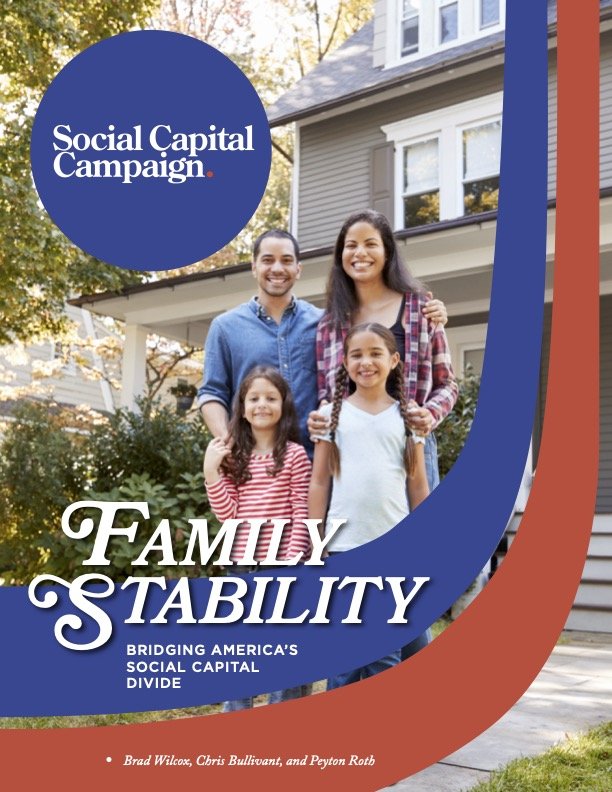
A Winning Policy AgendaRebuilding Social Capital
Social capital is fraying in the United States as more Americans live alone, delay or forgo marriage and childbearing, stop going to church, and volunteer lessSocial capital is fraying in the United StatesThe result is a deterioration of trust in each other, and in our institutionsThe Political
Opportunity
Americans across the spectrum feel the pain
74% of people in the U.S. say the country is “on the wrong track”
Such broad-based consensus is rare in politics
A candidate offering a clear vision for reversing the decades-long decay of our most fundamental relationships and institutions would address some of the deepest felt needs of the electorate
Top Policy Options
Many have diagnosed the problem; few have offered a path forward. In the Social Capital Campaign’s recent reports, we have done so. We examined the current challenges across five core building blocks of social capital, and what policymakers can do to address them:
-
Expand the child tax credit (CTC) to allow parents to keep more income to cover child-raising expenses, with an even larger expansion for children under the age of five. An expanded credit could be structured to be delivered in a tax return, in monthly payments to parents through the IRS, or as a new monthly benefit through the Social Security Administration (with costs offset by elimination of the existing CTC and reform of other family size-based credits).
-
Paid Family Leave - Congress should implement a national paid parental leave program to ensure that all parents—irrespective of their state of residence or occupation—have the time and financial resources to care for their infant in the weeks after birth. Paid leave is associated with reduced neonatal fatalities, increased rates of breastfeeding, reduced reliance on welfare and debt, and an increase in labor force participation and wages. Funding for leave could be provided in a number of ways, including through a lump sum of funds given to parents during pregnancy or at birth via the tax code, allowing parents to “pull forward” future social security funds to finance paid leave, or through a stand-alone federal social insurance paid leave program.
-
Levels of trust are also higher at the local level for government, media, faith institutions, and trust in neighbors. Building on that trust is required to rebuild social capital that keeps communities together. Yet our philanthropy and volunteering have since the 1970s been increasingly focused at the national level. As such, resources should be funneled to more local and faith-based groups that place a premium on relationships and relationship-building through a number of policy levers, and build local social capital. Such as:
Create a new 501c3p designation in the tax code for nonprofits providing human services in their community. States would be able to create a tax-exempt fund that donors could give to, which would then distribute donated funds as a dividend to 501c3p organizations in their state.
Considerably expand the existing charitable deduction to allow filers who take the standard deduction to also deduct charitable deductions up to a certain amount, or, to include low-income and working-class filers, providing an above-the-line deduction for donors who have no tax liability.
Expanding voucher options in existing federal welfare programs to provide more provider choice.
Providing a federal grant for the development of “family hubs” or community-wide mentoring strategies for families that could be championed by a local nonprofit, church, or other community organizer.
-
Child care is a perennial and growing stressor on new parents. Democrat solutions have focused on pouring billions of dollars into the Child Care and Development Block Grant (CCDBG), funding more public childcare but providing little to nothing for parents who prefer faith-based care or would rather have a parent stay at home to care for children themselves. Resources should not be biased against stay-at-home parents, especially given the extensive body of research that shows kids do best when staying with their parents in the early years. Candidates should propose steering childcare resources to parents with wide flexibility, allowing them to choose between stay-at-home care, faith-based and independent care, or public care. This could be accomplished through an expanded voucher program within CCDBG, or, more effectively, through development of an explicit parent benefit in the tax code.
-
Young people want viable career pathways that set a trajectory for family stability and provide the sense of purpose so essential to building healthy social capital. Career and Technical Education (CTE) pathways for high school students, such as Career Academies, have been shown to lead to higher earnings for participants and even increase likelihood for marriage and healthy family formation. Successful CTE programs should be studied, piloted through nonprofits or other community organizations, and scaled to provide viable alternatives to young people who do not choose a college path. Junior High and High Schools should also take steps to incorporate digital skill instruction and practice into curriculum to equip students for the modern workplace.
-
Marriage penalties in federal supports should be eliminated by doubling the income eligibility threshold for married parents with children under the age of five in every federal welfare program with an existing marriage disincentive.
Our Published Reports-

Rebuilding Social Capital
A Winning Policy Agenda
Chris Bullivant
Exploring the top Policy options to Rebuild Social Capital and Support Families
-

Family Stability
Bridging America’s Social Capital Divide
Brad Wilcox,
Chris Bullivant,
Peyton RothExploring the social capital divide between the wealthy and the working class
-

Family Affordibility
Building Social Capital at Home
Abby McCloskey
Five problems and five solutions for family affordability in America today
-

Work
Social Capital Works
Marco Ambrosio
Chris Bullivant
Patrick T. Brown
Jane Oates
Peyton RothHow to build social capital through ESG, better workplace policies, meaningful work for prime-age men, digital skills, and artificial intelligence
-

Civil Society
A Civil Society-Celebrating Diversity of Opinion
Chris Bullivant
A society strong in social capital can celebrate a diversity not just of backgrounds but opinions too
-

The Early Years
Youth Investment
Chris Bullivant
Explore the specific challenges present today for our youth
-

Asequibilidad Familiar
Construyendo Capital Social En Casa
Abby McCloskey
Cinco problemas y cinco soluciones, asequibilidad familiar en America hoy









